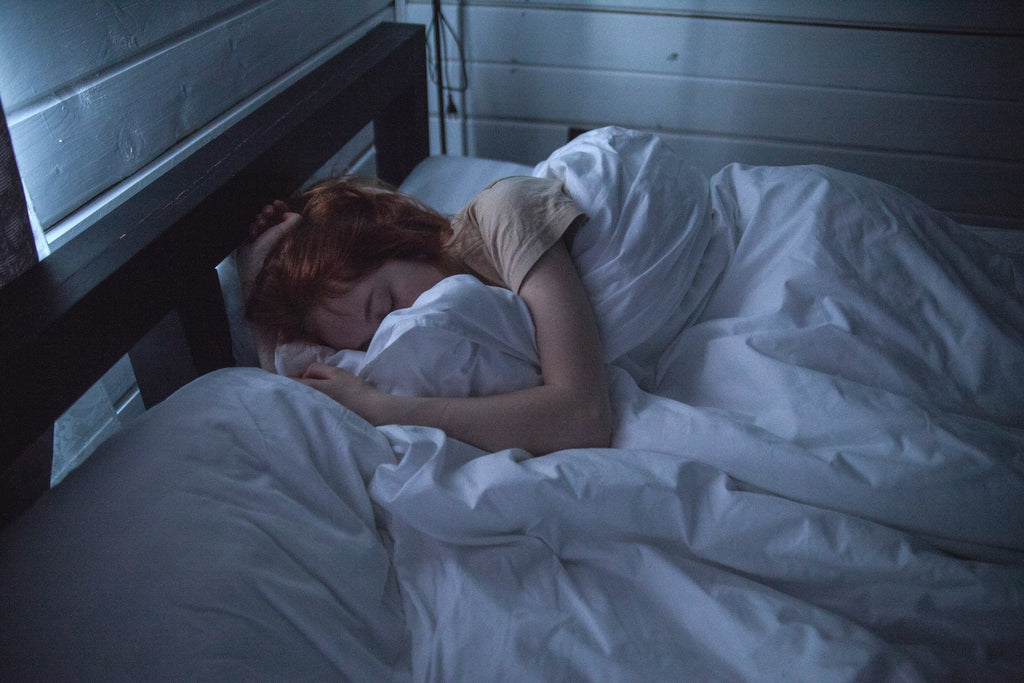
How To Get More Deep Sleep — 5 Tips for Better Sleep

A night well rested will become a day well spent! Entering the deepest stages of sleep is essential for making sure your upcoming day is as smooth sailing and stress-free as possible.
Plus, the right amount of deep sleep is also vital for your immune system and for your body to produce enough human growth hormone. To add to the long list of benefits of deep sleep, it also aids in long-term memory and warding off Alzheimer’s disease.
However, there could be plenty of reasons why reaping the benefits of deep sleep could be difficult, whether it be taking one too many power naps throughout the day or having that late-night coffee too close to bedtime. These bad habits can disrupt your circadian rhythm and your body’s production of melatonin, throwing off your sleep patterns and making it hard to reach the deep sleep stage.
Don’t worry; with these five tips, you will be able to get enough deep sleep in your sleep cycle in no time.
Set Yourself Up To Get the Proper Amount of Rest
This one may sound self-explanatory, but it can be one of the most important tips to remember when trying to get enough sleep and avoid sleep deprivation and sleep disorders. Research shows that any healthy adult should be getting at least seven hours of sleep, with the preferred amount of overall sleep being at least eight hours. A significant portion of this total sleep is non-rapid eye movement sleep, also known as light sleep, the phase of sleep when your brain waves haven’t yet slowed down.
You may even need more than eight hours of sleep to feel well-rested and like you got a good night’s sleep when you wake up the next day, but make sure you get at least eight. A combination of REM sleep and non-REM sleep (NREM sleep) will set you up for an easier day once you wake up knowing you’ve had great sleep quality throughout the night.
There are a number of ways that you can ensure that you’re getting enough shut-eye. Most importantly, you should try and stick to a consistent sleep schedule. If you’re going to bed at 9 p.m. one night and then 1 a.m. the next, your body is going to get confused about when it is time to rest everyday.
With that being said, here are some ways you can make sure you’re sticking to a consistent sleep schedule:
- Designate a preferred time to start your bedtime routine, even on the weekends.
- Set a reminder on your phone to make sure you’re getting to bed at the same time each night.
- Keep a daily morning alarm on your phone rather than relying on yourself to make sure you’re getting up at the same time every day.
- Both Android and IOS smartphones have bedtime modes, sleep tracking, and blue light filtering features, so implement these handy features on your electronic devices to motivate yourself to build positive sleep habits.
After implementing these strategies for a while, your body will quickly get used to going to bed and getting up at the same time every day. As simple as this tip is, it can often be overlooked when trying to get more deep sleep. Day-to-day tasks can be hard enough on the mind and body, so make sure you’re getting the sleep that you need and deserve!
Ensure Sure Your Bed Is as Comfortable as It Possibly Can Be
If you have the first tip down and you’re getting to bed at the same time each night, your sleep should be something that you look forward to. Yet, if you wake up in the morning and your back feels stiff from your all too-firm mattress those eight hours of sleep you get can feel like they were wasted, no matter how much deep sleep you got.
Making sure you have bedding materials that work for you and your needs and guaranteeing you are as comfortable as you can be will help send you into a deep sleep much easier. The type of bedding materials that will work best for another may not be the best for you, even picking between a soft mattress and a more firm mattress can impact your sleep.
Here is a list of some options to upgrade your sleep experience. Make sure to wash them frequently to boost your sleep hygiene.
- Mattress pads will provide some more comfort and support
- Memory foam pillows should give you some much-needed support for your head and neck
- Lightweight sheets will help you glide into a deep sleep
- Silk pillowcases ensure that you’re staying cool and comfortable throughout the night
- Silk sheets will also help keep your body cool at night
Those are just a few of the items you can add or switch out of your current bedding in order to make sure getting that restful sleep is as easy as possible. Deep sleep nourishes the mind and the body, so make the experience as enjoyable and relaxing as you can with some new bedding.
Make Sure Physical Activity Is Part of Your Daily Routine
Oftentimes, when we are finally trying to get to bed at the end of a long day, all of a sudden we become restless. You could be craving that nap all day, but it can be very frustrating having your head hit the pillow at night and be confronted with a surge of energy and brain activity.
To prevent these types of roadblocks when it comes to sleep, make sure you get moving throughout the day. You don’t have to work yourself to exhaustion, but if your body is exerting some energy on some sort of workout, by the time you’re in your bedroom, you should be able to fall asleep in no time.
This isn’t to say that you aren't already working hard throughout your day-to-day routine in general, but if you find yourself unable to fall asleep once night rolls around, some exercise should really help to get into that deep sleep.
These are some exercises you can begin to implement in order to wind down easier at night:
- Go on a 30-minute walk
- Take a quick run around your neighborhood to get your heart rate up
- Take a drive to your local gym and pump some iron for an hour
- Go to an early morning workout class, whether it be yoga, pilates, or whatever sounds most fun to you
Most importantly, whatever physical activity you choose to engage in, make sure it’s something you’re having fun doing. Again, it doesn’t have to be an intense workout every time, but your body will thank you once you’re easily able to get that deep sleep you’re craving.
Keep an Eye On What You’re Eating & Drinking
We have all been there before; the night is winding down but suddenly we have a craving for caffeine at 10:00 or we’re about to head to bed and suddenly our stomach is growling, so we head up for a midnight snack.
Certain types of foods can lead to a lack of deep sleep (and cause problems like high blood pressure, heart disease, and obesity), such as processed carbs and sugary drinks, so try and reduce the number of foods you consume on a day to day basis that fall into that description.
Going to bed on an empty stomach or after a heavy meal is also generally not going to help you get that peaceful sleep you’re looking for, so try and make sure that you eat a couple of hours before bed so your body has some time to digest. Try and aim for your last meal to be at least three hours before heading to sleep.
Here are some foods and drinks to avoid if you’re looking to get deeper sleep:
- Highly processed foods
- Caffeinated drinks
- Sodas and other high-sugar drinks
- Nicotine products
- Alcoholic beverages
Cutting just a few of these foods out of your diet when you’re struggling to get to bed can make a significant difference in the type of sleep you’re getting.
Ease Your Daily Stresses and Worries
Sometimes racing thoughts and anxieties about that coming day or any sort of struggles you’re dealing with are what keep you up at night. It becomes even more difficult for you to fall into that state of deep sleep when your mind is running ahead of you, so make sure you can do whatever you can to get calm before heading to bed.
The different stages of your bedtime routine may look different from others. Maybe taking a warm bath before bed will quiet those thoughts or watching your favorite comfort show will ease some tensions. Whatever it may be, making sure these thoughts are properly addressed and calmed plays a critical role in maintaining deep sleep.
If you’re struggling with calming the mind before bed, these are some useful tips to help slow down your thoughts at night:
- Try to stay off your phone at least 30 minutes before bed
- Journal your thoughts
- Listen to your favorite podcast
- Light some candles and play some calming music
- Read a couple of chapters of a book
- Listen to ASMR or ambient music
You won’t be able to get that restful sleep that you need if your mind is running at a faster pace than the rest of your body, so ensure that you’re taking care of your mental health! In turn, getting a well-deserved night of sleep will help you have fewer anxieties and racing thoughts the following day.
Summary
All in all, there is clearly an abundance of ways in which you can improve your quality of sleep. Deep sleep is essential for a happy and healthy day-to-day, so don’t deprive yourself of the rest that will leave you feeling better than ever.
Be sure to closely follow the tips mentioned above and you should be getting that deep sleep in no time.
Sources:
Do I Need a Firm or Soft Mattress? | Sleep Foundation
How do food and drink affect your sleep? | Health Navigator
Is Eating Before Bed Bad for You? - The best approach to late night snacking | Health Essentials




